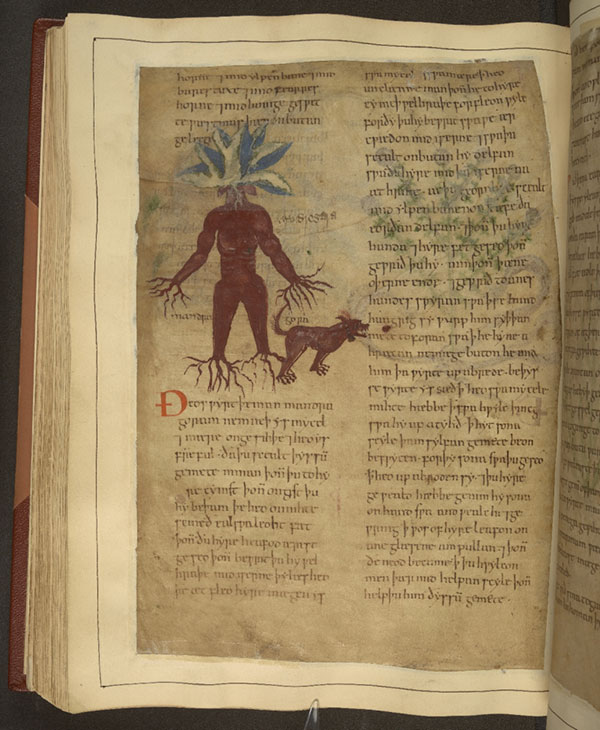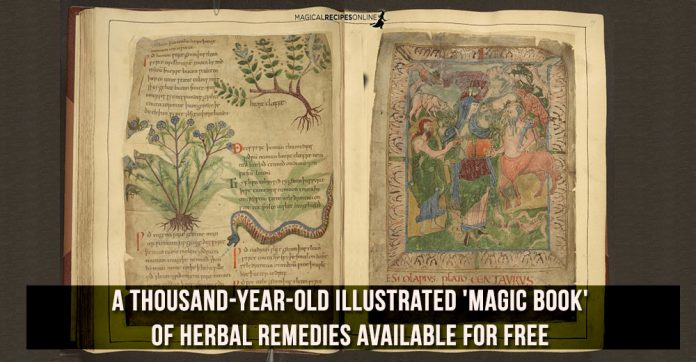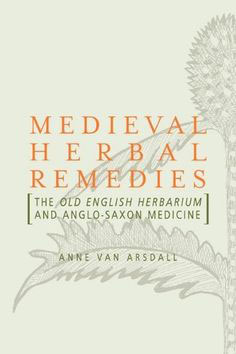The Quest for the Herbal Magic is older that we can possibly know. Herbal Magic is what gave life to biology, modern medicine and chemistry. At some point, especially during the Dark Ages, preparing herbal remedies were considered ‘satanic’ rituals and all who practiced it could be accused for Witchcraft. And we all know that this didn’t end well most of the times! However, there were bright souls who didn’t bite the dust, and work hard to preserve the ways of Green Witchcraft.
The Oldest Illustrated Book of Shadows on Herbal Remedies
We happily present you now the ‘Cotton MS Vitellius C III’. A 1.000-year-old illustrated manual, kinda like a Book of Shadows of the Herbal Witch. This manuscript (Cotton MS Vitellius C III) is the only surviving illustrated Old English herbal, or book describing plants and their uses. (There are other much older but unfortunately non-illustrated manuscripts) Translated from Latin to Old English, it gives details on almost everything – herbal magic related topics. Thanks to the British Library it has now been digitalised and is available for everyone to explore the Wonders of Herbal Magic.
Visit here the British Library and browse online this rare magic book of ancient Herbal Remedies. Through a wonderful zoom-in and zoom-out ability, you can browse in the website of the British Library, the majestic information of herbal remedies for many health or aesthetic conditions. – Click here to go to the British Library and read it for free.

Herbal Remedies and Magic Plants
Each page features an illustration of a plant or animal and with the variations of the herb’s name in various languages. In this amazing manuscript you will see descriptions of ailments it can be used to treat several health issues. You will be guided on how to find and pick the herb. You will also find ancient remedies for poisonous bites of snakes and scorpions. For instance, in one page, a snake appears near the entry for sweet basil, called ‘snake plant’ (naedderwyrt), because it was reported to grow where snakes were found. This particular herb was widely used in the ancient times to cure snake bites.
In the Magic Book you will find Herbs of the Witches for example the dragonswort from which we take the dragon’s blood (see here about the dragon’s blood and the dragon’s blood ink). As it’s well known the dragonswort is not indigenous to the British countryside. It grows at the tops of mountains where there are groves of trees, chiefly in holy places and in the country that is called Apulia. And of course, the most powerful herb of the witches would not be excluded. You will find lore and information about the mandrake (see here our article on Mandrake – Mandragora). I’m pretty sure you are already familiar with the bizare lore of the Mandragora which was said to attract witches, shine at night yet also flee from impure persons. There are however more information on how to collect it. To pick it, the text claimed you needed an iron tool (to dig around it), an ivory staff (to dig the plant itself up), a dog (to help you pull it out), and quick reflexes.
You can get your copy of this majestic Manuscript translated into modern english here.


